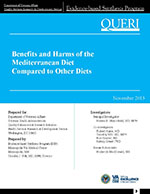
Principal Investigator:
Hanna E. Bloomfield, MD, MPH
Co-investigators:
Robert Kane, MD;
Timothy Wilt, MD, MPH;
Eva Koeller, BA;
Nancy Greer, PhD
Research Associate:
Roderick MacDonald, MS
Download PDF: Complete Report, Executive Summary, Report, Appendices
A large number of epidemiologic studies have investigated the association between diet and mortality and morbidity. Of particular recent interest is the Mediterranean diet, first described by Ancel Keys over 50 years ago. This diet is characterized by high intake of olive oil, fruits and vegetables, whole grains and cereals, legumes, fish, and nuts; low intake of red meat, dairy products, and sweets; and moderate intake of red wine with meals. Epidemiologic studies have shown that the incidence of cardiovascular disease in populations that consume such diets is lower than in populations that consume a more typical "Western" diet that is rich in red meat, dairy products, processed and artificially sweetened foods, and salt, with minimal intake of fruits, vegetables, fish, legumes, and whole grains.
Based on these epidemiologic studies, several randomized controlled trials were conducted to test the hypothesis that adopting a Mediterranean diet in adulthood reduces chronic disease burden (eg, incidence of and/ or mortality from cardiovascular disease, cancer, diabetes, hypertension, cognitive impairment, and kidney disease) and/or all-cause mortality (viz, PREDIMED, Lyon Heart Study, THIS-DIET). These trials included populations from a variety of geographical locations and with a spectrum of demographic and clinical characteristics.
Although several systematic reviews of the relevant observational studies and clinical trials have been published, the V's Evidence-based Synthesis Program, in conjunction with the Office of Quality and Performance and in response to a request from the V's National Center for Health Promotion and Disease Prevention and Primary Care Services, commissioned the present study to update prior reviews and to specifically assess the implications for the treatment and prevention of common chronic conditions in the Veteran population. With input from topic nominators and a Technical Expert Panel (TEP) we developed the following Key Questions:
Key Question 1: Is the Mediterranean diet more effective than other diets in preventing death or the development of type 2 diabetes mellitus, cardiovascular disease, cancer, hypertension, cognitive impairment, or kidney disease?
Key Question 1a: Do the effects vary by gender, age, or BMI?
Key Question 2: Compared to other diets, is the Mediterranean diet associated with fewer adverse outcomes (including death) or less disease progression in people who already have diabetes, cardiovascular disease, cancer, hypertension, cognitive impairment, rheumatoid arthritis, or kidney disease?
Key Question 2a: Do the effects vary by gender, age, or BMI?
Key Question 3: What is the observed adherence to the Mediterranean diet in studies conducted in the United States or Canada?
Bloomfield H, Koeller E, Greer N, MacDonald R, Kane R, Wilt T. Effects on Health Outcomes of a Mediterranean Diet with No Restriction on Fat Intake: A Systematic Review and Meta-analysis. Annals of Internal Medicine. 2016;165(7):491-500. doi:10.7326/M16-0361. doi:10.7326/M16-0361.
Benefits and Harms of the Mediterranean Diet Compared to Other Diets - Management eBrief